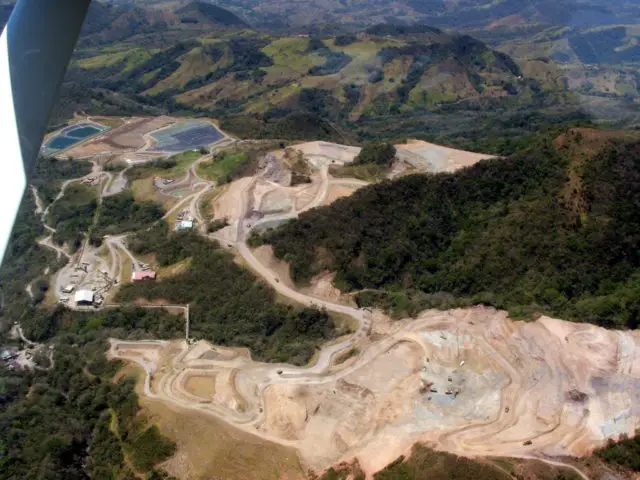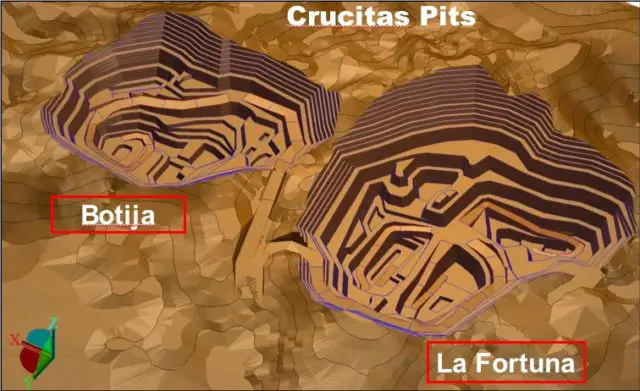Open-pit mining is an industry that creates very negative environmental, visual, human, and cultural impacts.
It is an industrial activity that is carried out by the removal of large quantities of soil and subsoil that are processed mainly with substances that are toxic to our ecosystem, having as a consequence the affectation of the flora and fauna bringing about important harmful changes in the area worked, after the exploitation.
In addition to the environmental impact that the exploitation of open pit mining can cause, it has consequences for human health, such as respiratory or nervous system problems. The gases emitted and dust in suspension can permanently jeopardize neighboring communities in the area of these mines.

This kind of mining produces irremediable consequences that cannot be avoided, for example, to the water supply; open-pit mining dumps solid and industrial waste contaminants into the river basins.
Open-pit mines alter the natural environment in such a way that it is very difficult to recover it, not even with the reintroduction of the original species. Although In recent times, some entities have tried to implement compensatory measures in order to achieve the rehabilitation of the affected area, putting in place the conditions that allow a new habitat.
For all these reasons, Costa Rica recently became the 1st country to ban open-pit mining and the use of toxic substances, such as cyanide and mercury.
In an extraordinary session that took place in the Legislative Assembly of Costa Rica, a law was presented against open-pit mining in order to stop the great damage that this practice causes to our environment, 50 legislators voted in favor of the project that prohibits the exploitation of gold with this method and also the use of cyanide and mercury.
The session was attended by environmental and community leaders who are affected by mining in the country. The deputies, who voted in favor, did so unanimously, giving support to the ban that puts end to mining practices pernicious to the ecosystem.
This legislation allows some underground mining activity that will only be used for artisanal purposes in the communities. There were no votes against, despite the pressure of the leaders of the Geological College of Costa Rica and businessmen who are members of the mining chamber of the country.
The new legislation ends all the administrative petitions that had been introduced by private companies that were awaiting approval from the competent authorities to exploit in forest reserves and national parks. With this, a substantial advance is achieved from the socio-environmental approach, since this way it definitely terminates the projects that were being promoted in the mountain ranges of Talamanca, Golfito, San Ramon, Puntarenas, Abangares, as well as others in the north of Costa Rica.
This new law prohibits the exploitation and exploration in protected areas such as national parks, the Osa area, in the south of the country as well as in the Gulf of Nicoya basin.
The legislators of the country want this law to protect forests and ecosystem in order to increase ecotourism in these areas. Stating that to continue with this type of open pit mining for the extraction of metals cause deforestation and destruction of the wildlife.
According to the legislator that redacted the proposal: “the law is the product of the struggle of Costa Ricans environmentalists against open-pit metal mining with 90% of the population opposing this activity”.
This new law grants a term for artisanal miners of Abangares, Guanacaste, to continue using some regulated products for their work in the next eight years. In addition to this, there will be a temporary waiver so that the underground mining activity is only of an artisan nature in the specific communities.
Costa Rica is a country that has always been characterized by its promotion of environmental conservation, which is why government entities reason that it is counterproductive to be a country that preserves the environment and conservation and at the same time continue to allow mining activity.
This law will not affect the activities in Crucitas, which is the main gold mine in the country, carried out by the Canadian company Infinito Gold Ltd. IG.V, and which has a license to continue with its mining operations.

Crucitas has an estimate of 1.2 million ounces in gold reserves. The company alleges that its activity does not cause any environmental damage.
